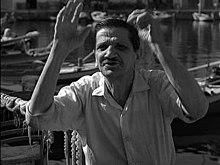
Werner Herzog is a German film director, screenwriter, author, actor, and opera director, regarded as a pioneer of New German Cinema. His films often feature ambitious protagonists with impossible dreams, people with unusual talents in obscure fields, or individuals in conflict with nature. His filmmaking process includes disregarding storyboards, emphasizing improvisation, and placing the cast and crew into similar situations to characters in his films.

Aguirre, the Wrath of God is a 1972 epic historical drama film produced, written and directed by Werner Herzog. Klaus Kinski stars in the title role of Spanish soldier Lope de Aguirre, who leads a group of conquistadores down the Amazon River in South America in search of the legendary city of gold, El Dorado. The accompanying soundtrack was composed and performed by kosmische band Popol Vuh. The film is an international co-production between West Germany and Mexico.

Even Dwarfs Started Small is a 1970 West German absurdist comedy-drama film written, produced, and directed by Werner Herzog.
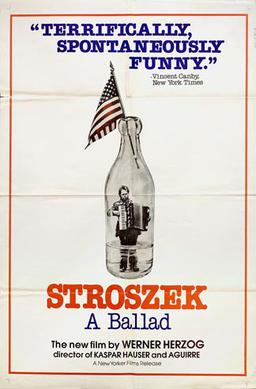
Stroszek is a 1977 German tragicomedy film directed by Werner Herzog and starring Bruno S., Eva Mattes, and Clemens Scheitz. Written specifically for Bruno S., the film was shot in Plainfield, Wisconsin, and North Carolina. Most of the lead roles are played by non-actors.

Nosferatu the Vampyre is a 1979 horror film written and directed by Werner Herzog. It is set primarily in 19th-century Wismar, Germany and Transylvania, and was conceived as a stylistic remake of F. W. Murnau's 1922 German Dracula adaptation Nosferatu. The picture stars Klaus Kinski as Count Dracula, Isabelle Adjani as Lucy Harker, Bruno Ganz as Jonathan Harker, and French artist-writer Roland Topor as Renfield. There are two different versions of the film, one in which the actors speak English, and one in which they speak German.
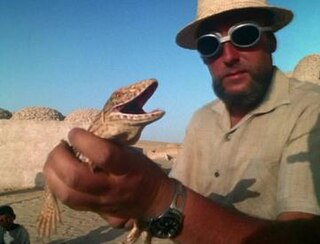
Fata Morgana is a 1971 film by Werner Herzog, shot in 1968 and 1969, which captures mirages in the Sahara and Sahel deserts. Herzog also wrote the narration by Lotte H. Eisner, which recites the Mayan creation myth, the Popol Vuh.

Spinalonga is an island located in the Gulf of Elounda in north-eastern Crete, in Lasithi, next to the town of Plaka. The island is further assigned to the area of Kalydon. It is near the Spinalonga peninsula – which often causes confusion as the same name is used for both.

How Much Wood Would a Woodchuck Chuck is a 1976 documentary film by German director Werner Herzog, produced by Werner Herzog Filmproduktion. It is a 44-minute film documenting the World Livestock Auctioneer Championship held in New Holland, Pennsylvania. The film also contains a section about the Amish and shows Amish speaking Pennsylvania German.

La Soufrière – Warten auf eine unausweichliche Katastrophe is a 1977 documentary film in which German director Werner Herzog visits an island on which a volcano is predicted to erupt.

The Great Ecstasy of Woodcarver Steiner is a 1974 documentary film by German filmmaker Werner Herzog. It is about Walter Steiner, a celebrated ski jumper of his era who worked as a carpenter for his full-time occupation. Showcased is Steiner's quest for a world record in ski flying, as well as the dangers involved in the sport. Herzog has considered it one of his "most important films."

Herakles (Heracles) is a 1962 short film and the first film by the German director Werner Herzog, then 19 years old.
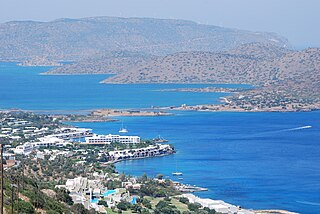
Elounda, alternatively transliterated as Elounta or Elouda, is a small town on the northern coast of the island of Crete, Greece. It is part of the municipality of Agios Nikolaos.
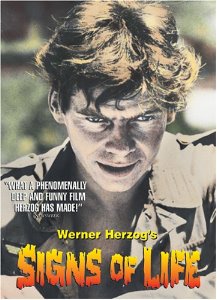
Signs of Life is a 1968 feature film written, directed, and produced by Werner Herzog. It was his first feature film, and his first major commercial and critical success. The story is roughly based on the short story "Der Tolle Invalide auf dem Fort Ratonneau" by Achim von Arnim.
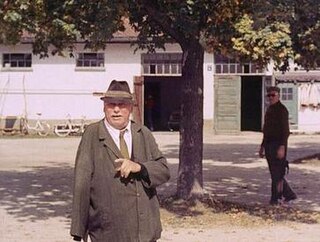
Precautions Against Fanatics is a short film by Werner Herzog filmed at a harness racing track near Munich, Germany. It was Herzog's first film shot in color.
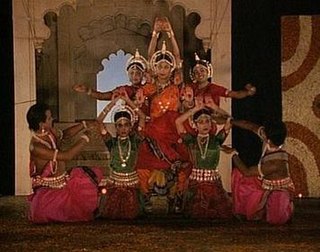
Jag Mandir, sometimes known by its subtitle, The Eccentric Private Theatre of the Maharaja of Udaipur, is a 1991 documentary film directed for television by Werner Herzog. The bulk of the film consists of footage of an elaborate theatrical performance for the Maharaj Arvind Singh Mewar at the City Palace of Udaipur, Rajasthan staged by André Heller.
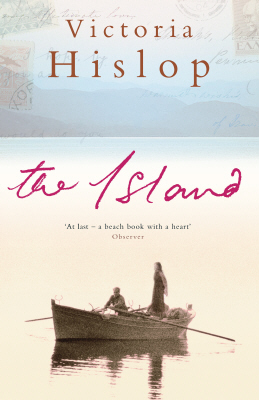
The Island is a historical novel written by Victoria Hislop. It won several awards including Newcomer of the Year at the 2007 British Book Awards. The book was nominated for the Book of the Year award at the same event.

Ballad of the Little Soldier is a 1984 documentary film directed by Werner Herzog and Denis Reichle about children soldiers in Nicaragua. The film focuses on a group of Miskito Indians who used children soldiers in their resistance against the Sandinistas.

To Nisi is a Greek television series based on the best-selling English novel The Island by Victoria Hislop airing on Mega Channel. The series premiered on 11 October 2010 to record ratings and critical acclaim. It is the most expensive Greek television production ever with a budget of €4 million.

Kalydon is an uninhabited island area near to and belonging to Elounda, Crete, Greece. It is made up of the island of Spinalonga, the Peninsula Spinalonga and the island of Kolokythas along with other smaller islets. The term Kalydon is often applied to each of the Spinalonga islands as their alternate historic name that was further re-established in modern Greek naming, whilst Spinalonga is still the preferred naming in the public.
Maurice Born was a Swiss architect, ethnographer, sociologist and writer, known for his work on the study of the leper colony of Spinalonga in Greece.
